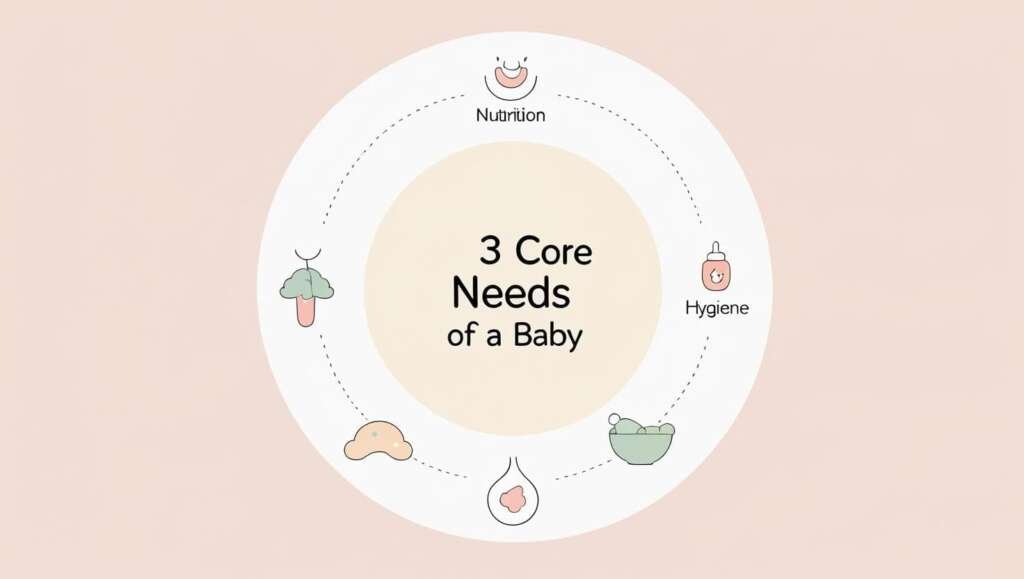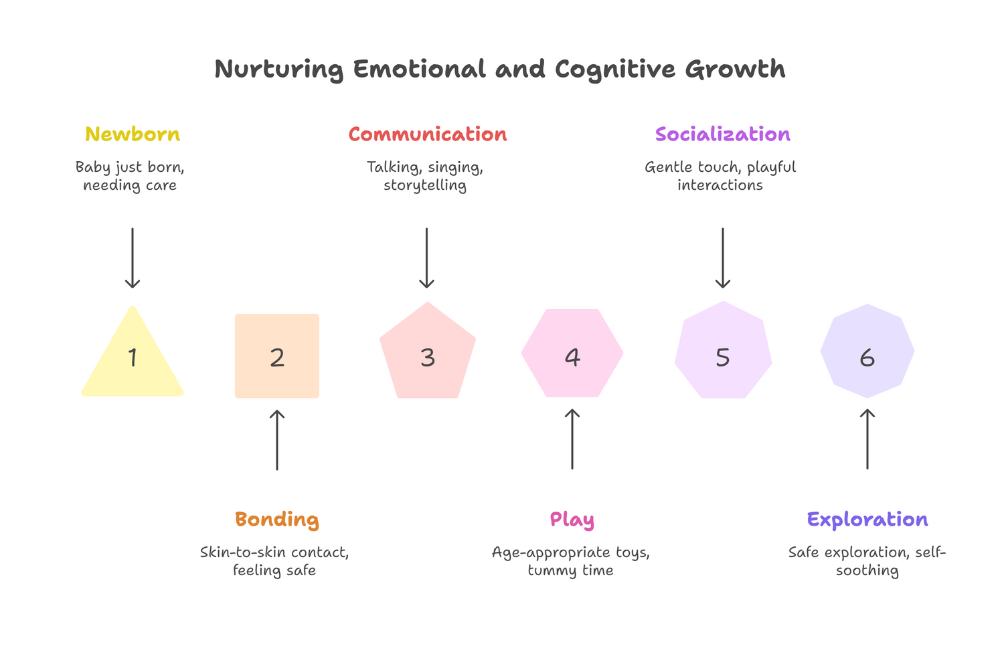It is 2 in the morning and your baby is crying. You have fed them, changed and rocked them, but nothing helps. Baby Scoopnurturement comes in here; it is a one-way process providing beyond feeding and changing diapers. Work hard in the area of bonding and development, as well as providing a secure, loving environment. Consider Jennie, a new mother who did everything by the book and still could not put the baby to sleep. When sleeping with her baby skin-to-skin, reading aloud, and using some calming bedtime rituals, she noticed that her baby was happier, and she felt more confident as a mother. In this guide, we will give some helpful baby tips, scoopnurturement hints, considerations on how to nurture your baby with love and confidence.
What Does Baby Scoopnurturement Mean?
Baby scoopnurturement is an overall process of nurturing your baby in all aspects of support, physically, emotionally, and mentally. It is not only about surviving care, such as feeding and diaper changes. Scoopnurture provides bonding, trust, and comprehensive development, making your child have a sense of safety, love, and exploration. Consider it to be an optimal combination of care (his or her needs are met) and connection. It covers all the behavioral aspects, such as cuddling before bedtime, supporting your infant as he/she tries to roll, talk, or even walk.
What Are the Core Needs of a Baby?
The healthy growth of every baby lies in the three things and they are nutrition, sleep, and cleanliness. With love, consistency, and care, these are the building blocks of nourishment and help babies become strong, secure, and happy.

Feeding Baby
Feeding is the focus of a baby’s growth. Breastfeeding includes attachment advantages and natural defenses, and the benefits of formula milk are safe and reliable for parents who need flexibility. What matters most is that your baby gets consistent nutrition and you are assured of your choice. Most babies will be ready to take solids at about six months. Begin with simple foods like bananas, avocados, or sweet potatoes and slowly introduce new foods in order to manage an allergy. They are still largely breastfed and or formula-fed even at the first year when they are being fed solids. The diet combined with protein, iron, calcium, vitamins, and health-rich fat leads to the stimulation of physical growth and the development of the brain.
Essential Sleep
Sleep promotes development, enhances immunity and brain development. Newborns typically sleep 14-17 hours per day in short increments, whereas infants begin to have more organized sleeping habits. Toddlers are in no shape to sleep much and still need 11-14 hours of sleep and maybe two naps. The kids will sleep better in a secure and quiet sleeping environment. Place them on a crib on their backs on a firm mattress and without loose bedding. Consistent sleep schedules and regular sleep routines with clear signs that it is time to sleep tell the child it is bedtime, which helps reduce fussy behavior and encourages healthy habits.
Baby’s Health and Hygiene
- Frequent Visits and Immunizations: This includes regular checkups and inoculations to ensure the baby is not affected by any disease and to determine the baby’s progress.
- Bathing and Skin Care: Bathe your baby 2-3 times a week and wash their face, hands and diaper area every day. Use mild soaps and skin moisturizers; this will keep the baby’s skin healthy.
- Good Oral Hygiene Early On: Clean gums with a wet piece of cloth as soon as teeth come in until the baby toothbrush can be used with just a smidgen of fluoride toothpaste. The bottles at bedtime should be avoided to prevent decay.
- Healthy Habit Building: Consistency in medical care, skincare, and oral hygiene practices lays a healthy foundation for a lifetime and safe development.
How to Provide Emotional and Cognitive Nurture?

Baby Bonding
As soon as your baby is born, bonding sets in and is the essence of scoopnurturement. Your baby’s heartbeat, temperature, and breathing rate will stabilize, and you will feel safe and loved by using simple techniques like skin-to-skin. As the babies feel safe in the hands of their parents, they grow with good confidence and emotional maturity as they grow up, referring to bonding as one of the most lucrative investments in the future of a child.
Communication
Although at the beginning of life the baby does not talk, communication begins immediately. Sound and word: Speaking and singing to your baby encourages language development, helps the baby to improve on listening skills, as well as offers comfort to your baby through recognition of the sound of their voice. It is important, as well, in how you respond to their cries. Storytelling and reading are also encouraged on a daily basis, leading to healthy cognitive developmental stages.
Play Activities
Play is not fun at all; it is an important learning and developmental tool. Age care toys, rattles, to stacking blocks promote problem-solving skills as well as fine motor skills and create interest. Tummy time is one of the most important early activities that strengthens the neck, shoulders, and core muscles, which are important in crawling and walking. Above toys and routines, sensory activities include colors, textures and tone sounds in games, helping your baby be less confused with the world.
Social Interaction
The early experiences in the social environment are critical to formative emotional development. Babies learn to know empathy and trust by smiling, being treated with gentle touch and exchanges accompanied by playfulness with the parents. Playing with siblings or peers provides social flexibility and adapts to cooperation as well.
Exploration and Independence
Safe exploration should be encouraged as a way of letting babies learn how to be confident and independent. As children learn to reach around, crawl to something, and self-soothe, they experience resilience. Guided independence makes babies capable of solving problems and grow ready to face greater struggles.
How to Develop a Supportive Environment for Scoopnurturement?
Baby-Proofing the Home
Baby-proofing your home is a great start towards this. Clear electrical outlets, fasten heavy furniture to a wall, and install gates at stairwells. Putting small items out of reach will prevent your baby from exploring them with great danger.
Choosing Safe Baby Gear
Baby care essentials are designed to improve day-to-day life. Firm mattresses should be used in cribs, proper fitting of car seats should take place and strollers should be installed with well-established safety harnesses. Beware of safety certifications before buying.
Maintaining a Consistent Environment
A relaxed house environment will decrease pressure and promote sleep and emotional composure. Regular sleeping, feeding, and play patterns make the babies feel their needs are taken care of.
Does Motherhood Scoopnurturement Affect Baby Growth?
Managing Stress as a Mother
Stress is a way of life in raising a child, yet excess stress may disrupt attachment with your child. Taking a small nap, deep breaths, and a walk are some of the small activities that can help mothers stay present to care for and assist their children.
Importance of Self-Care
A mother who is well rested, healthy, and emotionally stable can nurture better. Eating healthy, staying hydrated, and making time to relax are all some of key components of scoopnurturement in motherhood.
Building Strong Support Systems
The solution to prevent isolation is family members, friends, parenting groups, and Online communities. With able support, it becomes easy to nurture, and mothers can share their experience and advice.
Common Challenges in Baby Scoopnurturement
| Challenge | Solution |
| Colic & Excessive Crying | Soothe with swaddling, gentle rocking, white noise, or consult a pediatrician if persistent. |
| Sleep Regressions | Stick to consistent routines, avoid overstimulation, and offer extra comfort. |
| Feeding Struggles & Picky Eating | Introduce foods gradually, offer variety, and reintroduce foods multiple times without pressure. |
| Separation Anxiety | Keep goodbyes short, reassure your baby, and increase separation gradually. |
What to Follow for Effective Baby and Motherhood Scoopnurturement?
- Pediatrician Recommendations: Doctors stress the importance of routine check-ups, on-time vaccination, and sensitive upbringings. Observing milestones and adapting schedules to the demands of the baby is at the center of scoopnurturement.
- Key Developmental Milestones: Rolling, sitting, crawling and walking and first words are major stages to be observed. Monitoring of these assists the parents to celebrate progress and notice whether additional assistance is required.
- Seeking Professional Help: When there is a failure to develop normally or to address long-standing issues, seeking medical advice from a pediatrician or child specialist is necessary. A difference can be made in growth and learning through early intervention.
Wrap Up
Baby care and nurture involve more than basic care; they integrate nutrition, sleep, hygiene, and emotional well-being to ensure the baby’s well-being and growth. Positive feeding, fostering healthy sleep patterns and upholding healthy habits form a good backbone. Most importantly, a quiet and amicable atmosphere enables babies to develop into secure, confident and happy.
FAQs
Basic care meets survival needs, while scoopnurturement also focus on bonding, emotional growth, and overall development.
By keeping routines consistent and prioritizing quality time, working parents can nurture just as effectively.
Play begins from birth, simple talking, singing, and later tummy time and sensory toys encourage learning.
It ensures mothers care for their own well-being, which helps them nurture their babies more effectively.
A happy baby who feeds well, gains weight, and meets milestones is usually receiving enough nutrition.


